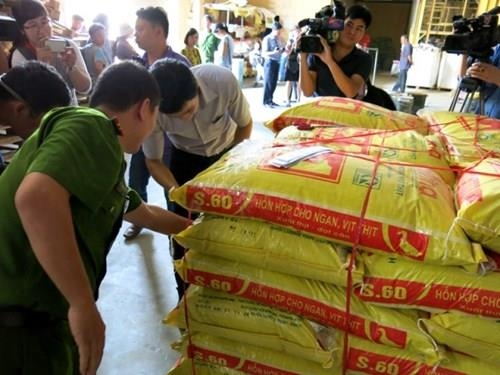 Society
Society

HCM City tightening catering services in schools
 |
| Authorities inspect an animal food dsitributor in HCM City. — VNA/VNS Photo |
HCM CITY – The main causes of increased risk of school-food poisoning in HCM City are diverse but uncontrolled food sources, the increased number of school-food producers and the many unlicensed small-scale production workshops, experts have warned.
In mid March, tens of students of Trần Quang Khải Primary School in District 1 were hospitalised due to school-food poisoning after having lunch provided by the city-based Tâm Tâm Ltd. Company.
HCM City’s Food Hygiene and Safety Department later investigated the company and discovered many food safety-related violations, fining it VND48 million.
The company did not give periodic health check-ups for workers, and the process of production didn’t guarantee food hygiene conditions.
Also absent were measures to prevent harmful insects and pests, the dining rooms and tables weren’t kept in a hygienic condition, and the drainage system in the kitchen didn’t meet health standards.
The department’s deputy director, Nguyễn Thị Huỳnh Mai, said there were only regulations regarding the sources of food, but not the hygiene conditions when workers distributed the food to students. Many schools put the food in a corridor before dividing it up, so it was difficult to avoid it getting dusty.
“Distributors don’t wash their hands even before dividing it up, allowing bacteria from their hands to infect the food,” she said.
The department not only examined school-food producing workshops, but also investigated and discovered five canteens in high schools and colleges that violated food safety standards.
Tighten school-food sources
To prevent food poisoning and guarantee food safety in schools, the city’s Department of Education and Training has asked all schools that provide lunch meals to re-examine their food hygiene measures.
School kitchens have to be granted a license on food safety conditions and ensure that edibles were hygienically covered.
Schools have to sign a contract to source their food from licensed foodstuff companies. Schools should implement a three-step examination that includes the source of the food, processing, and the finished food and distribution to students.
All steps are to be supervised by the school managing board, head cook and health staff who are responsible for signing an inspection book every day.
Workers at school kitchens and canteens have to pass training courses on food safety and hygiene, as well as be given periodic health check-ups.
Workshops supplying school-food must meet the conditions on the food safety certification, which includes specialised food boxes and hygienically-covered vehicles for carrying the food.
Deputy Director of the city’s Education and Training Department, Bùi Thị Diễm Thu, said headmasters must be responsible for cases of food poisoning if the cause involved foodstuff supplied at school.
The school managing board has to inform the health department and relevant agencies about cases of food poisoning, with the aim of coordinating resources and solving the matter quickly.
The city now has 2,820 schools ranking from kindergartens to universities that have dining services. Of that, 1,620 have collective kitchens, 880 have canteens and 320 have signed contracts with school-food supplying companies. – VNS




